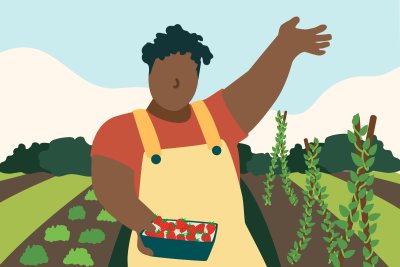New fringe farming toolkit helps growers overcome barriers to land access and farming
Sustain's new Fringe Farming Toolkit provides practical tips to support growers, aspiring growers, campaigners, food partnerships and local community groups overcome common barriers to peri-urban farming across the UK.

The toolkit has been developed by the Fringe Farming project, a collaboration between UK food, farming and land organisations and Sustainable Food Places, a cross-organisation food partnership network programme. The guide is based on their experiences of working with food partnerships and with valuable input from pioneering practitioners.
Each guide (or tool) of the toolkit addresses three key barriers:
- Accessing land for agroecological food production
- Understanding how the planning system works for fringe farms
- Gaining local authority support for fringe farming
Designed with fringe farmers in mind but still applicable to those in urban and rural areas, it is jam-packed with practical tips to help you on your next step!
Bella Driessen, Local Policy Coordinator at Sustain, says
We’re lucky enough to work alongside highly experienced practitioners – including farmers, food partnerships, and local authorities. Through this, we’ve come to realise the enormous wealth of knowledge out there, but we wanted to try and bring it together in a format that people can easily access and interpret. It’s enormously important that people are supported to create more fringe farms, for local economies, for the environment, and for the health and wellbeing of local communities. We hope this toolkit can provide some of that support.
Download the toolkit here.
Key terms
Fringe farming
Fringe farming is a term used for agroecological food production – particularly small-scale market gardens – in the outskirts of towns and cities.
Agroecological farming
Agroecological farming - at the heart of this project - takes an integrated approach to producing food where ecological and social principles underpin regenerative systems that work with natural cycles, develop fair livelihoods and equitable land access, and value farmers’ knowledge. The Food and Agriculture Organisation describes 10 elements of agroecology
Peri-urban
The hinterlands, outskirts or fringes of towns and cities.
03/10/2023


